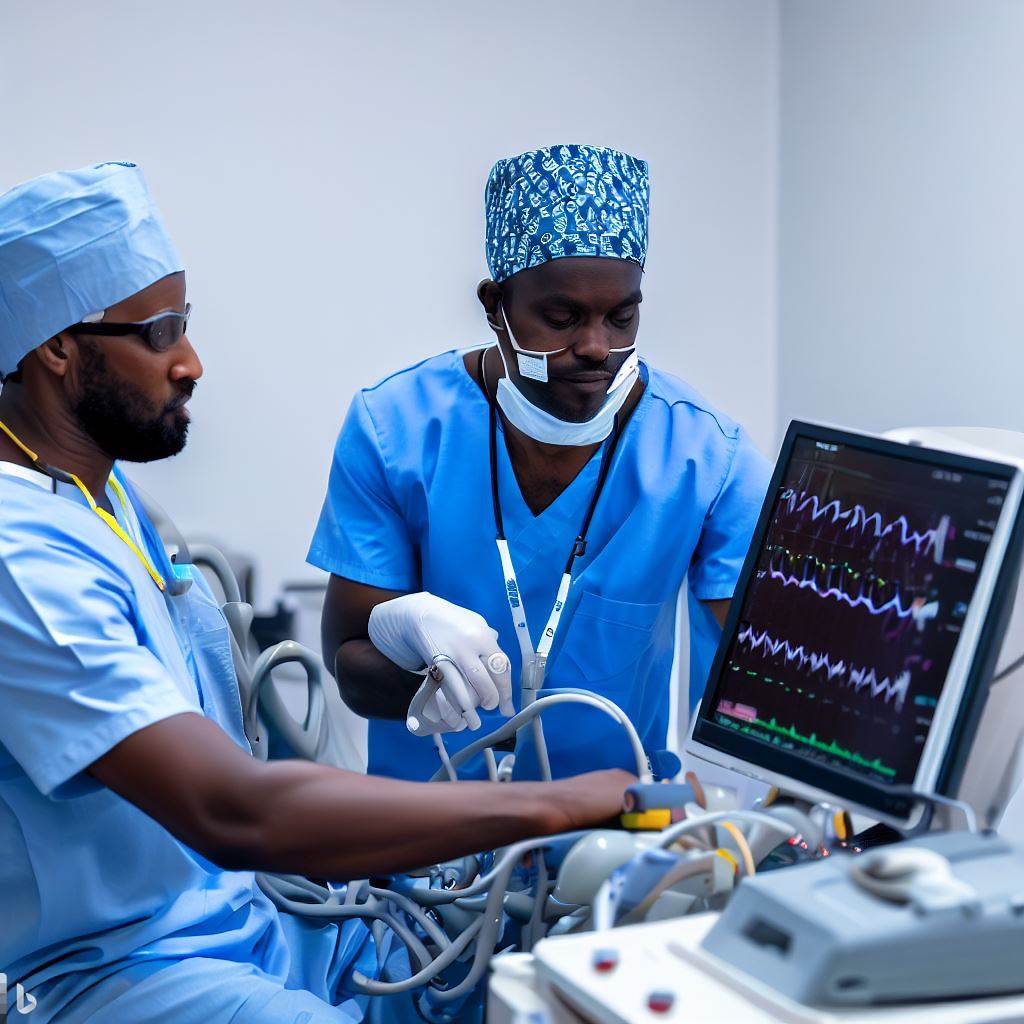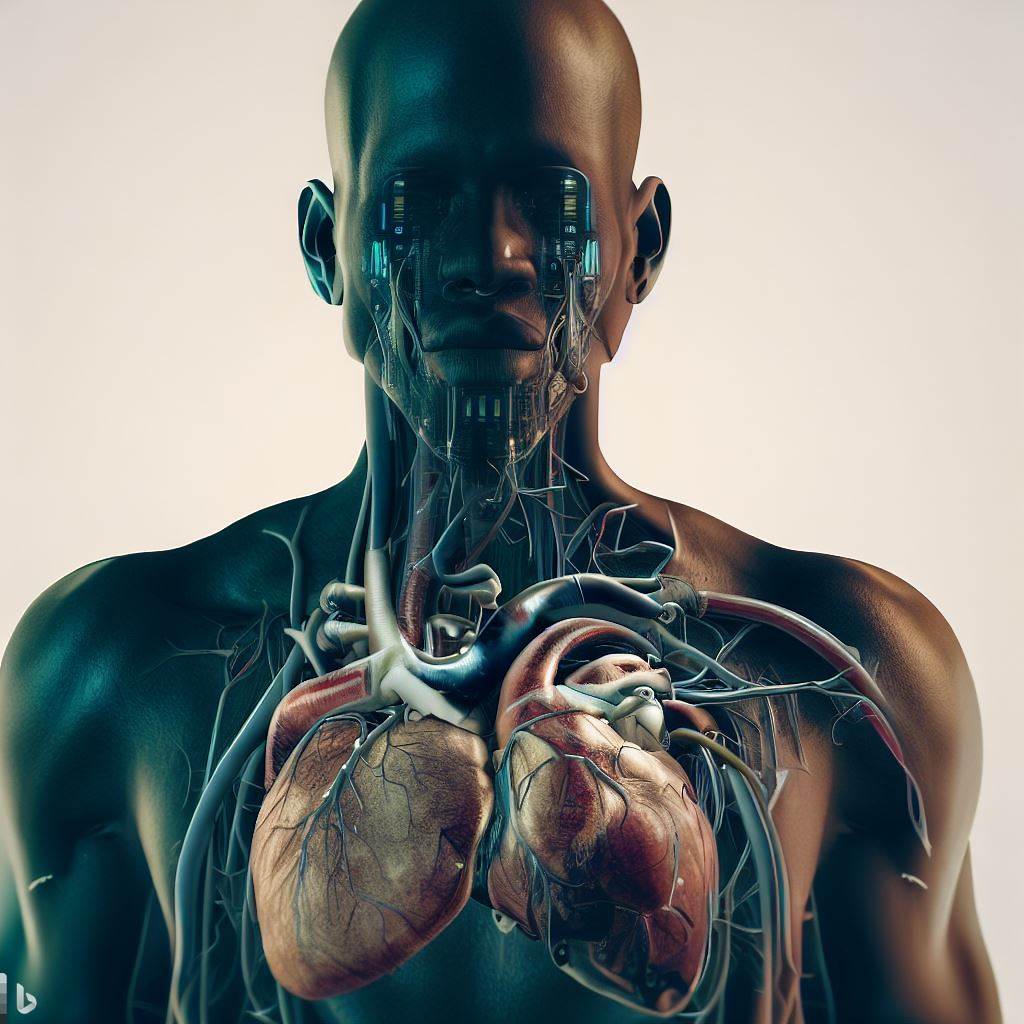Introduction
A cardiovascular technologist is a healthcare professional who performs diagnostic procedures on patients’ cardiovascular systems. They play a crucial role in the healthcare industry by assisting physicians in diagnosing and treating heart and blood vessel conditions.
Cardiovascular technologists are essential in the cardiac care team, ensuring accurate and timely diagnosis, treatment, and monitoring of patients. Their expertise and skills enable healthcare providers to make informed decisions and develop appropriate treatment plans.
The purpose of this blog post is to provide an in-depth understanding of the career path of a cardiovascular technologist. It aims to shed light on the responsibilities, education and training requirements, and potential career opportunities available in this field.
Through this blog post, readers will gain insights into the importance of cardiovascular technologists and how they contribute to patient care. Furthermore, it will serve as a valuable resource for individuals considering a career in cardiovascular technology, helping them make informed decisions about their future path.
By exploring the definition, significance, and purpose of cardiovascular technologists in the healthcare industry, this blog post aims to provide a comprehensive overview of this rewarding profession. Stay tuned for the upcoming chapters, where we will delve deeper into the exciting world of cardiovascular technology.
Educational Requirements
When pursuing a career as a cardiovascular technologist, certain educational requirements must be met:
- Obtaining a high school diploma or GED equivalent is the first step towards becoming a cardiovascular technologist. This provides the foundation for further education and training in this field.
- Completing an accredited cardiovascular technology program is crucial for gaining the necessary knowledge and skills. These programs typically include both classroom instruction and hands-on clinical experience.
- Obtaining specialized certifications can greatly enhance a cardiovascular technologist’s career prospects. Certifications such as the Registered c(RCIS) and Registered Cardiac Sonographer (RCS) can demonstrate expertise in specific areas.
- Having the required licenses is essential for practicing as a cardiovascular technologist. Each state has its own licensing requirements, which usually involve passing an examination and meeting certain educational and clinical experience criteria.
By meeting these educational requirements, individuals can establish a strong foundation for a successful career as a cardiovascular technologist.
Read: Case Study: Successful Real Estate Projects in Nigeria
Job Responsibilities
In order to gain a comprehensive understanding of the career path of a cardiovascular technologist, it is essential to delve into the specific job responsibilities that professionals in this field undertake. These responsibilities play a crucial role in the delivery of quality healthcare for patients.
Assisting with diagnostic procedures such as electrocardiograms (ECGs) and stress tests
Cardiovascular technologists play a vital role in assisting healthcare professionals, particularly cardiologists, during diagnostic procedures.
They are responsible for setting up and preparing the required equipment for tests like electrocardiograms (ECGs) and stress tests.
Their active involvement ensures accurate readings and smooth testing procedures.
Operating and maintaining medical equipment
Cardiovascular technologists are trained to operate a wide range of medical equipment used in their field.
They ensure that the equipment is in good working order and handle any technical issues that might arise.
They also perform regular maintenance to ensure accuracy and reliability in test results.
Collecting and analyzing patient data
Gathering and analyzing patient data is a critical responsibility of cardiovascular technologists.
They record patients’ medical history, observe their symptoms, and perform tests to collect relevant data.
The accuracy of this data greatly influences the diagnosis and treatment provided by physicians.
Collaborating with physicians and other healthcare professionals
Cardiovascular technologists work closely with physicians and other healthcare professionals to provide efficient and collaborative patient care.
They communicate test results and assist in the interpretation of data. This collaboration ensures accurate diagnosis and treatment plans for patients.
These job responsibilities require a certain skill set and expertise. Cardiovascular technologists need strong attention to detail, critical thinking abilities, and good communication skills. They must also stay updated with advancements in medical technology and procedures to provide the best possible care.
Overall, the job responsibilities of cardiovascular technologists are integral to the diagnosis, treatment, and ongoing care of patients with cardiovascular conditions.
Their active involvement in diagnostic procedures and collaboration with healthcare professionals ensures efficient and accurate delivery of healthcare services.
Read: Case Study: Successful Real Estate Projects in Nigeria
Work Settings
Cardiovascular technologists have a variety of work settings to choose from based on their interests and expertise.
- Hospitals and clinics: Many cardiovascular technologists work in hospitals and clinics, where they assist in diagnosing and treating patients with heart and vascular diseases. They work alongside physicians and other healthcare professionals to perform tests and procedures.
- Diagnostic imaging centers: Some cardiovascular technologists find employment in diagnostic imaging centers. These centers specialize in using technology, such as ultrasound or MRI, to create images of the heart and blood vessels. Technologists in this setting may focus on performing and analyzing these imaging tests.
- Research institutions: Cardiovascular technologists also have the opportunity to work in research institutions. In these settings, they participate in clinical trials and studies to advance knowledge in the field of cardiovascular medicine. Their expertise in performing tests and analyzing data is crucial for these research endeavors.
- Mobile diagnostic units: Another option for cardiovascular technologists is working in mobile diagnostic units. These units travel to different locations, such as nursing homes or community centers, to provide cardiac testing services to underserved populations. Technologists in mobile units must be flexible and adaptable to different environments.
Cardiovascular technologists thrive in diverse settings, each offering unique opportunities and challenges.
In hospitals and clinics, they collaborate with healthcare professionals and conduct procedures like echocardiograms and cardiac catheterizations.
Diagnostic imaging centers provide exposure to advanced technology and specialization options. Research institutions involve them in groundbreaking treatment development and data analysis. Mobile diagnostic units bring their services to underserved populations.
Across all settings, technologists are integral to the healthcare team, providing crucial data for accurate diagnosis and treatment of cardiovascular diseases. Their versatile contributions to the field advance patient outcomes and medical knowledge.
Read: Intellectual Property Rights Law in Nigeria Explained

Career Advancement Opportunities
Cardiovascular technologists have several opportunities for career advancement. These include:
Further specialization in specific cardiac procedures
Technologists can choose to specialize in areas such as echocardiography or vascular technology.
Specialization allows technologists to develop expertise in a specific area and perform advanced procedures.
Technologists may need to complete additional training or obtain certifications for specialized roles.
Supervisory or managerial roles
With experience and demonstrated leadership skills, technologists may advance into supervisory or managerial positions.
These roles involve overseeing a team of technologists and ensuring smooth operation of cardiovascular departments.
Responsibilities may include scheduling, training, and budgeting, in addition to clinical duties.
Education and research positions
Some technologists choose to pursue careers in education or research.
They may become instructors at cardiovascular technology programs or contribute to research studies in the field.
These roles allow technologists to share their knowledge and contribute to the advancement of cardiovascular care.
Consulting for medical equipment companies
Cardiovascular technologists with extensive experience can work as consultants for medical equipment companies. They provide valuable insight and expertise in the development and testing of new cardiovascular devices.
Consulting roles may involve collaborating with engineers, conducting trials, and providing feedback on product performance.
These career advancement opportunities offer cardiovascular technologists the chance to further their skills, contribute to the field, and take on new challenges.
Read: Nigeria’s Fight Against Corruption: Law’s Critical Role
Salary and Job Outlook
When considering a career path, salary and job outlook are important factors to consider. In the field of cardiovascular technology, these aspects can vary based on several factors.
Average Salary Range
The average salary range for cardiovascular technologists is between $55,000 and $80,000 per year. This range can be influenced by factors such as experience, education, and geographical location. Technologists with more years of experience and higher levels of education tend to earn higher salaries.
Geographical location also plays a role, as certain areas may have a higher cost of living or higher demand for technologists.
Factors Affecting Salaries
- Experience: Technologists with several years of experience may command higher salaries.
- Education: Higher levels of education, such as a bachelor’s degree, can lead to increased salary opportunities.
- Certifications: Holding certifications in specialized areas of cardiovascular technology can also impact salaries.
- Employment Setting: Salaries may vary based on the type of facility where a technologist is employed, such as a hospital, clinic, or research center.
Projected Job Growth in the Cardiovascular Technology Field
The job outlook for cardiovascular technologists is promising, with a projected growth rate of 7% from 2019 to 2029. This growth is faster than the average for all occupations and can be attributed to several factors.
An aging population contributes to the increased need for cardiovascular services, leading to a higher demand for qualified technologists. Advancements in medical technology also drive job growth, as new procedures and techniques require skilled professionals to operate and interpret results. The expanding role of cardiovascular technologists in preventive care and outpatient settings further contributes to the positive job outlook.
Ultimately, a career as a cardiovascular technologist offers a competitive salary range with potential for growth. Factors such as experience, education, certifications, and employment setting can influence salaries within this field.
Furthermore, the projected job growth rate is higher than average, creating favorable employment opportunities for aspiring technologists. With the increasing demand for cardiovascular services and advancements in medical technology, this profession is poised to thrive in the coming years.
Read: The Path to Becoming a Surgeon in Nigeria
Skills and Qualities Required
When pursuing a career as a cardiovascular technologist, there are several skills and qualities that are essential for success:
- Strong attention to detail: Cardiovascular technologists must be meticulous in their work to ensure accurate test results and diagnoses.
- Excellent interpersonal and communication skills: They need to effectively communicate with patients, doctors, and other healthcare professionals.
- Physical stamina and dexterity: This career involves standing for long periods and physically assisting patients during procedures.
- Critical thinking and problem-solving abilities: Cardiovascular technologists must be able to analyze test results and troubleshoot equipment issues.
Attention to detail, communication skills, physical stamina, critical thinking, and problem-solving are crucial for cardiovascular technologists. Tiny errors can have significant consequences, so protocols must be meticulously followed.
Interacting with patients and collaborating with healthcare professionals require excellent interpersonal skills. Physical fitness is essential for tasks like patient positioning and transfers. Critical thinking is vital in analyzing test results and troubleshooting equipment malfunctions.
Cultivating these qualities will ensure successful careers as cardiovascular technologists, providing quality patient care and contributing to cardiology.
Continuing Education and Professional Development
In order to thrive in the field of cardiovascular technology, it is crucial to stay updated with advancements in the industry. This can be achieved through continuing education and professional development opportunities.
Importance of staying updated with advancements in cardiovascular technology
- Evolving Field: Cardiovascular technology is constantly evolving, with new procedures, techniques, and technologies being developed regularly. Staying updated ensures that cardiovascular technologists can provide the best care to their patients.
- Enhanced Skills: By staying updated, cardiovascular technologists can enhance their skills and knowledge, allowing them to excel in their careers. They can acquire new skills, learn about cutting-edge technologies, and fine-tune their existing expertise.
- Quality Patient Care: Advancing technology directly impacts patient care. By staying updated, cardiovascular technologists can contribute to improved patient outcomes by utilizing the latest techniques and technologies in their practice.
Continuing education programs and conferences available
- Online Courses: Many institutions offer online courses that allow cardiovascular technologists to continue their education while working. These courses cover various topics such as imaging techniques, electrophysiology, and cardiac catheterization.
- Workshops and Seminars: Continuing education workshops and seminars provide hands-on training and allow cardiovascular technologists to learn from industry experts. These events often cover specific procedures or introduce new technologies.
- Annual Conferences: Professional organizations organize conferences where cardiovascular technologists gather to learn about the latest advancements, research, and best practices in the field. These conferences offer networking opportunities as well.
Professional associations and resources for networking
- Society for Cardiovascular Angiography and Interventions (SCAI): SCAI is a professional association dedicated to interventional cardiovascular medicine. They offer resources, educational programs, and networking opportunities for cardiovascular technologists.
- American Society of Echocardiography (ASE): ASE is a leading organization for cardiovascular ultrasound professionals. They provide resources for continuing education, online courses, and networking events.
- Cardiovascular Credentialing International (CCI): CCI offers certifications for cardiovascular technologists and provides resources for professional development. They also organize conferences and webinars for networking and learning.
- Online Forums and Social Media: Online forums and social media groups dedicated to cardiovascular technology offer a platform for technologists to connect, share knowledge, and discuss industry developments.
- Professional Journals and Publications: Subscribing to professional journals and publications in the field of cardiovascular technology helps technologists stay updated with the latest research and advancements.
Continuing education and professional development are essential for cardiovascular technologists to stay current in their field, provide excellent patient care, and excel in their careers.
By investing in their ongoing education, technologists can adapt to emerging technologies, maintain their expertise, and ultimately contribute to the advancement of cardiovascular healthcare.
Challenges and Rewards in the Career
Challenges
- Dealing with high-stress situations can be one of the biggest challenges for cardiovascular technologists.
- Being responsible for diagnosing and treating patients’ cardiac conditions requires quick thinking and problem-solving skills.
- Working in a fast-paced environment with critically ill patients can add immense pressure to the job.
- Handling emergencies, such as cardiac arrests or complications during surgeries, demands the ability to remain calm and composed.
- Maintaining accurate records and documentation is crucial, but it can be a time-consuming and meticulous task.
- Keeping up with advancements in technology and medical procedures requires continuous learning and adaptability.
- Interacting with anxious and fearful patients and their families can be emotionally draining.
- Working long shifts, including nights, weekends, and holidays, can disrupt work-life balance.
Rewards
Despite the challenges, the career of a cardiovascular technologist offers numerous rewards. One of the most fulfilling aspects is the opportunity to make a difference in patients’ lives by helping them improve their cardiac health.
Being involved in the diagnosis and treatment process gives a sense of purpose and satisfaction. Witnessing patients recovering and leading healthier lives due to the care provided is incredibly rewarding.
Cardiovascular technologists also experience personal and professional growth through their work. They have the chance to develop new skills and knowledge while keeping up with the latest advancements in the field.
There are opportunities for career advancement, such as specializing in a particular area or moving into supervisory roles. The demand for cardiovascular technologists is expected to grow, providing job stability and security.
Working in a collaborative healthcare team allows for valuable networking and learning from colleagues. Cardiovascular technologists often receive recognition and appreciation from patients, which boosts job satisfaction.
In a nutshell, the career path of a cardiovascular technologist comes with its own set of challenges and rewards. The high-stress situations and demanding responsibilities can be overwhelming, but the fulfillment of helping patients improve their cardiac health makes it worthwhile.
Additionally, the opportunities for personal and professional growth, along with job stability, make this career a gratifying choice for those passionate about cardiac care.
Read: How to Become a Diagnostic Medical Sonographer in Nigeria
Conclusion
We have discussed the career path of a cardiovascular technologist in detail.
Throughout this post, we have explored the education and training required, as well as the specific skills and responsibilities involved in this field. We have also highlighted the various job opportunities available for cardiovascular technologists, including working in hospitals, clinics, and research facilities.
For anyone interested in pursuing a career as a cardiovascular technologist, I encourage you to do further research and consider the rewards and challenges that come with this profession.
It is a challenging field, but also a highly rewarding one, as you have the opportunity to make a significant impact on the lives of patients. If you have any further questions or would like to learn more about becoming a cardiovascular technologist, I encourage you to reach out to professionals in the field or continue your research.
This chapter has provided a comprehensive overview, but there is always more to learn and explore in the ever-evolving field of cardiovascular technology.




